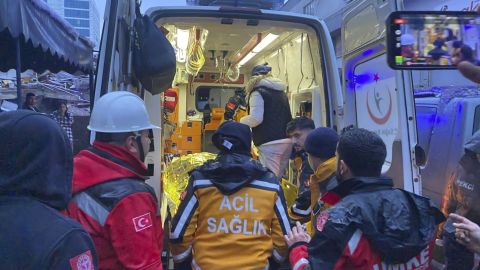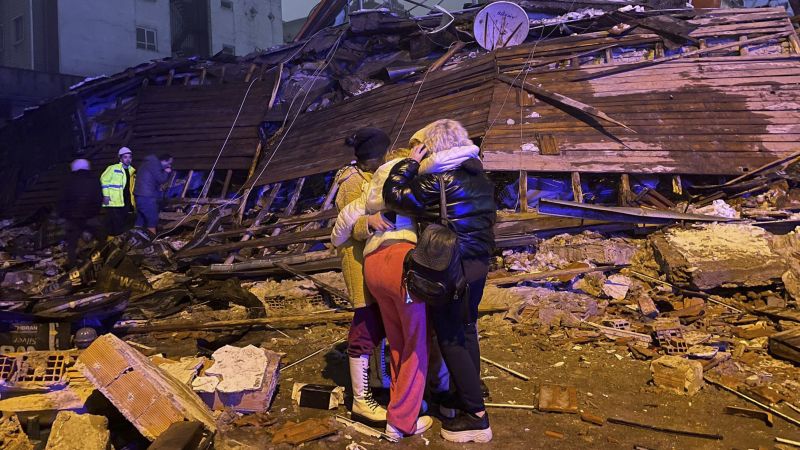Gaziantep, Turkey
CNN
—
Almost eight hours after a powerful earthquake struck Turkey and Syria early Monday, Dr. Abdurrahman Alomar and his family were bracing against the next onslaught.
With few safe places to go, the Syrian doctor, along his wife and two children, were taking refuge in his car, parked in an open area away from buildings.
Still, the ground continued to shake.
“I’m sorry, as I’m talking to you, a new aftershock is happening,” Alomar told CNN Opinion by phone from his car in the Turkish city of Gaziantep near the epicenter of the quake.
In the background, sirens wailed. And Alomar calmly described how hours earlier he had been woken by one of the strongest earthquakes to hit the region in more than a century.
Once the initial quake had passed, the family fled their apartment building for snow-filled streets, dressed in their pajamas and armed with little more than mobile phones.
For Alomar, a senior health adviser with the Syrian American Medical Society (SAMS), the priority now is providing medical assistance to northwest Syria.
A decade of civil war has decimated infrastructure and impacted medical supplies in this region, Alomar told CNN. He said that vulnerable facilities will be tested further by an earthquake which has already claimed thousands of lives — and is expected to claim many more.
This interview has been lightly edited for clarity. The views expressed in this commentary are Alomar’s own.
CNN: Describe the moment the earthquake struck.
Dr. Abdurrahman Alomar: It happened at 4:17 a.m. I was here in Gaziantep, sleeping with my family. We live on the sixth floor of a seven-floor apartment building, and when the earthquake started, I, my wife and my family jumped from our beds and searched for a safe place inside the house — but there was nowhere.
It was a really horrible and scary earthquake, measuring 7.8 and several minutes long.
We waited for the earthquake to end. Then we and other people in the building left in a hurry to the surrounding streets.
There was no time to take anything — only my mobile phone and ID card. I didn’t have time to even change out of my pajamas.
When I left the building, I saw the ceiling and walls of the entrance were damaged, but I couldn’t focus on the details.
Outside there was heavy snow — there’s been heavy snow for the last two days — and this is the main obstacle that the rescue operation will be facing.
CNN: And the aftershocks?
Alomar: The most troubling issue is the many aftershocks. About 45 minutes after the initial earthquake, there was another major aftershock, then a second and a third. And this was really very scary.
Now I’m in my car, in an open place, far from the buildings and with my family. We are in a safe place.
CNN: What is your role in relief effort?
Alomar: I’m working with the Syrian American Medical Society (SAMS) as a senior health adviser (my background is as a pediatrician). I work in the central office of SAMS in Gaziantep (in Turkey), providing medical assistance to northwest Syria, across the border.
I’m following up operations and medical services in our health care facilities and hospitals in northwest Syria. I’m giving support to our staff there — giving direction and delivering supplies and medicines as needed from the inventory.
And I’m talking to stakeholders — the World Health Organization, donors, our partners — for their support.

CNN: What is the situation in Syrian hospitals?
Alomar: In SAMS-supported hospitals in northwest Syria, we have received more than 800 casualties. And unfortunately, about 190 deaths.
The first hours after the earthquake the hospitals were overwhelmed by the number of casualties. But now the situation is stable. And we absorbed the first and most overwhelming wave of casualties.
But in northwest Syria, we are already suffering from a shortage of supplies, and we are now using the regular inventories in our warehouses.
So we are in urgent need of additional support to compensate these supplies for regular operations — and also to be ready for aftershocks and more casualties who may come to our hospitals.
CNN: What impact has a decade of civil war in Syria had on infrastructure?
Alomar: Eleven years of conflict left these hospitals damaged by airstrikes and bombardment from Russian and Syrian government armies.
And it’s the same situation for the houses there. So when the earthquake happened, this impacted hospitals and houses — already very weak.
I’m sorry, as I’m talking to you, a new aftershock is happening… it’s OK, we are safe.
CNN: In what ways are Syrian refugees in particular vulnerable to the earthquake?
Alomar: When we talk about refugees, those Syrian refugees in southern Turkey are in a better situation, in comparison with Syrian internally displaced persons (IDPs) in northwest Syria.
About 2 million of those IDPs are in camps. And those people are already in acute need of all kinds of assistance – from health to livelihood and food.

